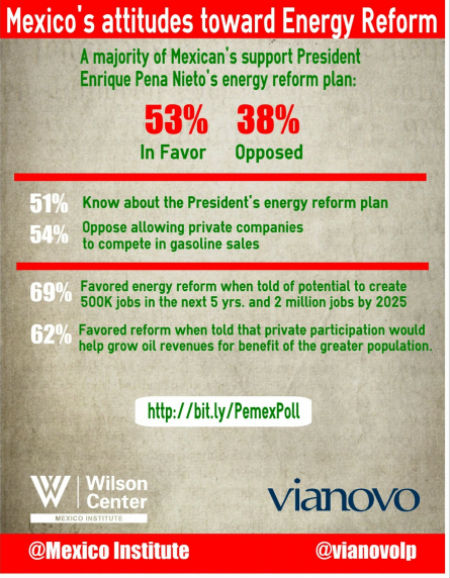Public Perceptions of Mexico’s Reform Agenda

More on:
Vianovo, a strategy consultancy, recently released a poll looking at Mexican impressions of the Peña Nieto government’s economic reform agenda. Interviewing 1,000 people in late August, they found that education reform is the public’s biggest priority—likely due to the teachers’ union protests (which snarled traffic around the capital for weeks) and to the heavy press as the Congress debated secondary legislation (passed in early September).
Coming in second is energy reform, with nearly a fourth of Mexicans considering it to be the most important issue at the moment (electoral, tax, and telecommunication reforms all garnered less than 10 percent of responses). Though the poll finds that not that many Mexicans have seen or read much about the current energy initiatives in front of Congress (just 50 percent), a slight majority are in favor of the reform.

The poll shows that while Mexicans are open to reform, they are wary of privatization. This finding dovetails with the more extensive research on political behavior done by Andy Baker, a professor of political science at the University of Colorado at Boulder. In his great book, The Market and the Masses in Latin America: Policy Reform and Consumption in Liberalizing Economies, Baker shows that while Latin Americans are generally in favor of economic opening (feeling the benefits of lower priced, higher quality goods), they are more wary of privatization—as in many cases it raised the price of services such as electricity and telecommunications.
Mexico’s government is arguing that one of the most important benefits of the reform will be lowering consumer prices of gasoline and electricity (as well as increasing jobs). This may well happen (both the government and independent analysts estimate that the reform could boost the economy by some 1.5 to 2 percent a year, increasing GDP growth by some 50 percent). But to gain greater support, the government will have to better explain why private investment in energy will differ from that of other sectors, where costs did not recede.
More on:
 Online Store
Online Store